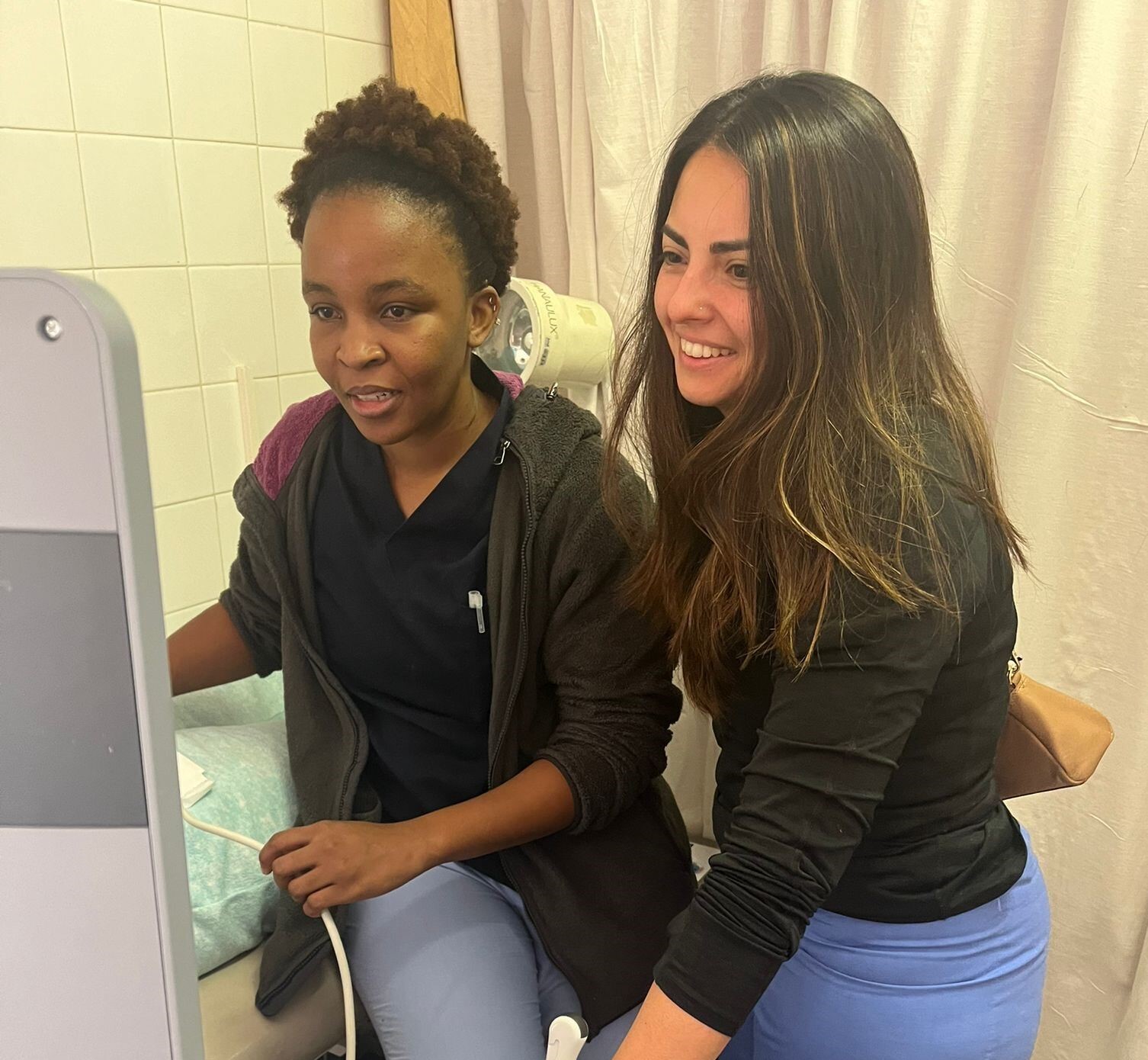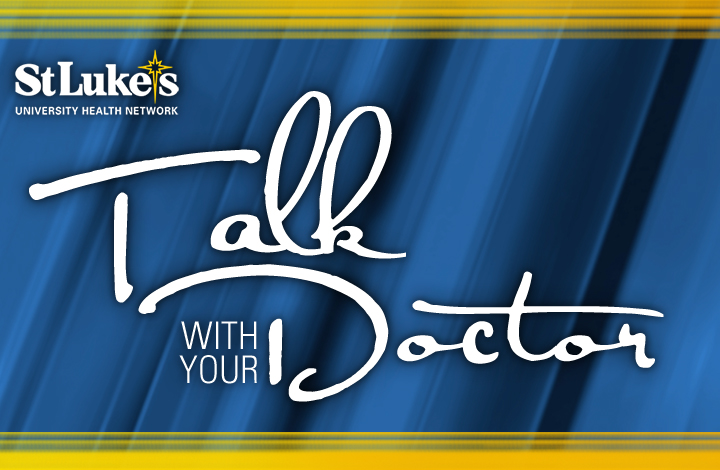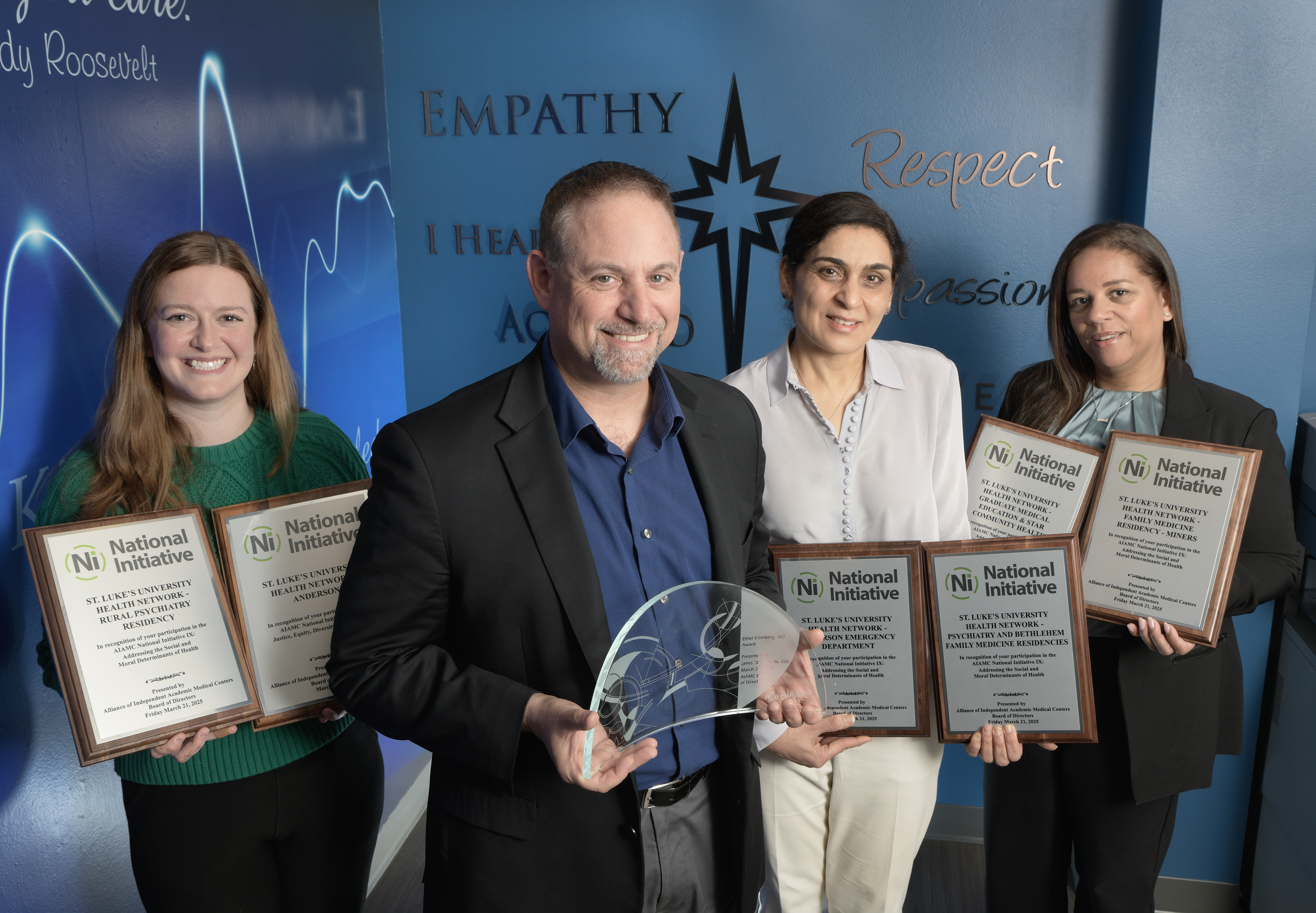Improving Pregnancy Outcomes in Southern Africa
September 17, 2024

Drs. Kamogelo Tomango and Odessa Hamidi perform a fetal ultrasound together at Princess Marina Hospital in Botswana.
A team of St. Luke’s maternal-fetal medicine (MFM) specialists traveled in July to the southern Africa country of Botswana to teach fetal ultrasound techniques to local medical professionals with the goal of improving pregnancy and birth outcomes in this developing country.
St. Luke’s physicians Odessa Hamidi, MD, and Jorge Tolosa, MD, MSCE, spent nine days in Gaborone, the capital of Botswana, at its teaching hospital and medical school presenting the Basic Training Course in Ultrasound in Obstetrics and Gynecology, developed by the International Society of Ultrasound in Obstetrics and Gynecology (ISUOG). They instructed alongside Daniela Febres-Cordero, MD, an MFM fellow from Beth Israel Deaconess Medical Center-Harvard, and Sally Hanson, MD, a general OBGYN who lives in Botswana. St. Luke’s MFM sonographer Dahiana Gallo MD, PhD, RDMS, remotely facilitated the use of an ultrasound simulator during the course.
They also guided hands-on screening of expectant mothers, and their fetuses, using ultrasound in the labor and delivery and OBGYN units at Princess Marina Hospital, which is affiliated with the medical school and university.
Maternal-fetal medicine, or perinatology, is a subspecialty of obstetrics and gynecology that focuses on managing of pregnancy complications in the mother and fetus, before and during pregnancy, and shortly after birth.
“We went there to empower health providers by teaching them to optimize the use of ultrasound technology to diagnose and treat pregnancy abnormalities in Botswanan women who suffer from a lack of many areas of medical care,” explained Dr. Hamidi, whose passion for promoting female/maternal health has been a driving force in her medical profession.
Ultrasound is a common method of diagnostic imaging that uses sound waves to create pictures of the inside of the body. While these machines are affordable and available in high-income countries, their cost to purchase, maintain and repair can be prohibitive in places like Botswana and other poor nations. Therefore, access to these machines, and local expertise, is limited.
According to the Centers for Disease Control and Prevention, Botswana’s maternal mortality ratio in 2020 was 186 per 100,000 live births, up from 118 in 2019. By contrast, the United States, where ultrasound machines are commonly used in pregnancy care, had 23.8 deaths per 100,000 live births in 2020.
One ultrasound examination during the training found a woman’s fetus to have with a dangerously slow heartrate, which can be treated with a pacemaker after birth. Ultrasound helped monitor the health of the baby closely during the pregnancy and ensure the heart was otherwise normal. The pediatrics team, in turn, was able to be present at the delivery and ensure that the baby was transported safely to a specialty hospital for treatment after birth, recalled Dr. Hamidi.
“This kind of positive outcome is the goal of having and correctly using this technology, which can save lives,” she said.
“Developing ultrasound proficiency requires understanding theory and technology and also having hands-on practice in order to diagnose common to life-threatening conditions like fibroids, fetal growth disorders, birth defects and placental abnormalities.”
Many in-utero complications are hidden or found late in pregnancy due to the lack of ultrasound access, which can result in preventable harm or even sometimes death of the mother and fetus or the birth of babies with severely abnormal conditions. The population’s high rate of HIV, as well as access to both primary and specialty medical care, can further complicate both pregnancy and birth, Dr. Hamidi added.
About 80 Botswanan doctors, residents and midwives in OBGYN, emergency medicine, family medicine, and radiology attended the course. The St. Luke’s specialists, Drs. Hamidi and Tolosa, partnered with their colleagues from Beth Israel-Harvard and OBGYN physicians within Botswana to teach the course, the first time ever it was presented in the country.
Because of the scarcity of ultrasound machines at the hospital—there’s only one each in the labor and delivery unit and the OBGYN clinic—the follow-up hands-on training provided by the specialists focused on OBGYN physicians and residents.
This St. Luke’s led mission trip also helped to strengthen the nascent educational partnership between St. Luke’s and the University of Botswana, the hospital and its medical school, along with Beth Israel-Harvard, explained Dr. Hamidi. This was her second medical trip to Botswana, the first taking place during her MFM fellowship training.
St. Luke’s medical mission trips to other struggling countries in Africa are common, fueled by the network clinicians’ passionate support for them. This year, the St. Luke’s International Medicine Program celebrated a decade of service to Cameroon in Central Africa, and a network nurse and clinical documentation specialist with St. Luke’s went as a volunteer to her home-country of Liberia to teach proper procedure coding and documentation skills.
Upon their return from Botswana, the doctors’ attention focused on their St. Luke’s patients with complicated pregnancies that they treat every day. They’re also planning to continue remotely the teaching they started and nurturing the relationships with the Botswanan and American specialists in hopes of improving the perinatal and birth outcomes, wherever possible, using education and ultrasound. They are also working with Dr. Gallo to research the impact of ultrasound teaching efforts in Botswana.
“We are fortunate and grateful to have access to the most advanced, lifesaving medical technology here in the US,” said Dr. Hamidi. “Sharing our expertise with providers in places with fewer resources, like Botswana, is one big step towards helping countries with fewer opportunities to create healthier beginnings for both mothers and their children.”
Read More NewsLatest News


April 10, 2025
National Recognition for SLUHN Graduate Medical Education

April 09, 2025
In Safe Hands Award

April 08, 2025